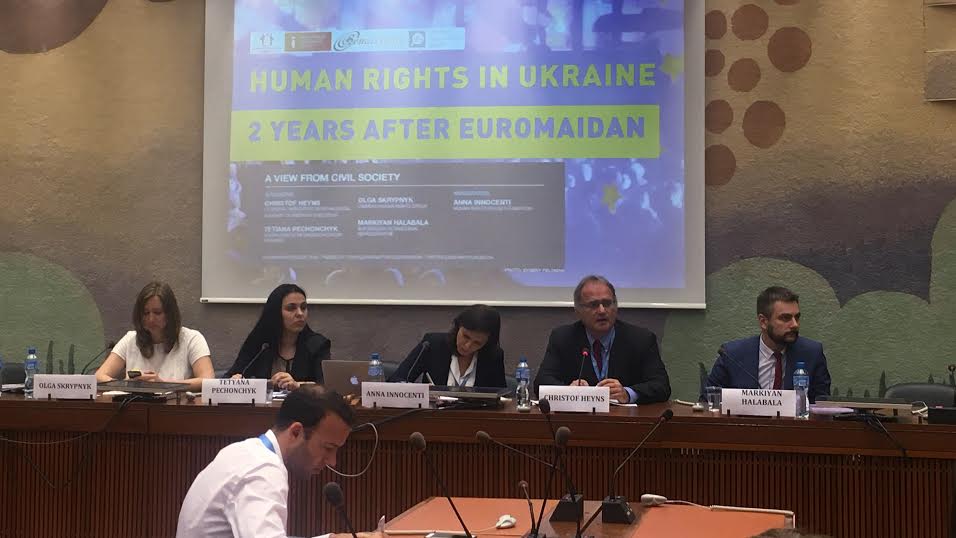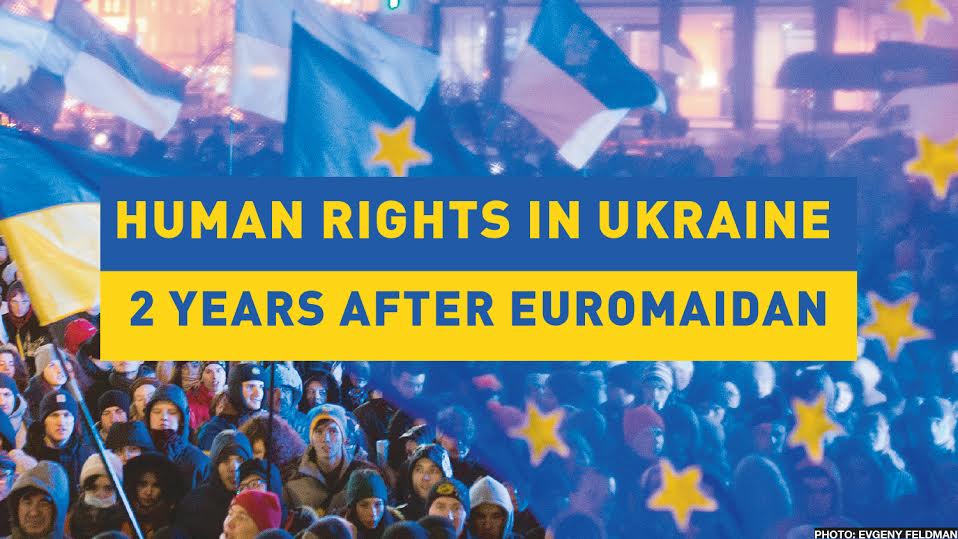Christof Heyns, UN Special Rapporteur on extrajudicial, summary or arbitrary executions, opened the panel, presenting his report detailing the outcomes of his mission to Ukraine conducted in September 2015, in which he examined the level of protection of the right to life in Ukraine, as well as the efforts undertaken to prevent unlawful killings and ensure accountability, justice, and redress in such cases.
“The right to life, if violated, must be properly investigated and those responsible held accountable,” asserted Heynes. “The legal system in Ukraine does not have a legal gap, but rather an implementation gap… We saw little evidence of progress in terms of accountability… and a message of impunity.”
According to the latest report on Ukraine by the Office of the UN High Commissioner for Human Rights (June 2016), some 9,371 people have been killed and 21,532 others injured in eastern Ukraine since the conflict began in mid-April 2014.
The report of the Special Rapporteur expresses concerns at the Ukrainian State tolerating the existence of politically motivated armed militias on its territory, and asserts that militias operate in a climate of impunity in Ukraine.
In addition to Heynes, the panel for the side event included: Olga Skrypnyk, Crimean Human Rights Group; Markiyan Halabala, Euromaidan victims legal representative; and Tetiana Pechonchyk, Human Rights Media Monitoring.

In recent years, the situation in Ukraine has been influenced by the ongoing conflict in Eastern Ukraine and by a climate impunity for violence, as well as flaws in the process of holding those responsible for the killings at Euromaidan accountable. The Russian occupation of Crimea has also had a marked impact on the human rights situation in the country.
Initially peaceful Euromaidan protests in Kyiv concluded in February 2014 with deadly force, resulting in the deaths of more than 100 people.
Markiyan Halabala, asserted that it will be difficult to get justice for all of the victims and their representatives.
“Attacks against protestors during Euromaidan were widespread and systematic… People who are guilty of these crimes have fled to Russia or Crimea, and evidence has been eliminated or destroyed… [However] some high-profile criminal cases will be brought to trial by the end of 2016,” said Halabala.
In April 2014, the Ukrainian government accepted the jurisdiction of the International Criminal Court over alleged crimes committed during Euromaidan.
“The occupation of Crimea is one of the most serious challenges to human rights, not only for Ukraine, but for international organisations and the international community” said Olga Skrypnyk.
Skrypnyk detailed the problems in Crimea, such as Russia’s concealment and misrepresentation of information: “Russia is trying to spread two major myths: ‘Crimea has always been Russian’ and ‘Crimea voluntarily joined Russia.’ But it is not true.”
She highlighted politically motivated prosecutions and the holding of political prisoners, referencing cases such as the “the February 26 case” in which Crimean Tatars were arrested for taking part in protests against the illegal referendum in Crimea, the labelling of the Mejlis (Crimean Tatar parliament) as an extremist organisation, and the “Hizb ut-Tahrir case” in which 14 Muslims were arrested for terrorist activities, despite no evidence being found of their involvement in such activities.
Skrypnyk spoke of regular violations of the right to freedom of expression and Russia seeking to “leave only controlled media in Crimea.” She also called attention to the rapid militiarisation of society in Crimea and systematic discrimination against non-Russian citizens.
On the Ukrainian authorities, she said: “The Ukrainian government is important in this situation. It must keep relationships with Crimeans, should not isolate and blockade Crimea, and should provide assistance and support to independent, international human rights missions in Crimea.”
Tetiana Pechonchyk spoke on Ukraine’s National Strategy for Human Rights and National Action Plan for Implementation to 2020, and called on the government to take further steps in this regard.
Pechonchyk welcomed the adoption of the strategy: “It is a comprehensive document, detailing clear indicators, results, what draft laws should be prepared, and which agencies and ministers are responsible for the preparation.”
She called on the Ukrainian authorities to include provision for war crimes and crimes against humanity in national legislation, and expressed her disappointment that Ukraine’s ratification of the Rome Statute of the International Criminal Court had been postponed by three years.
She expressed her hope that Ukraine would create a State investigation bureau to deal with crimes committed by senior officers and law enforcement agents, and to investigate torture cases. She also called on Ukraine to implement transitional justice principles, with effective criminal prosecutions and rehabilitation of victims. Further, she addressed the need to document war crimes and violations of international human rights law, and to create a national database for this.
Ukraine at the HRC and HRHF advocacy work
The UN Human Rights Council will discuss and potentially adopt a resolution on Ukraine during the last week of the 32nd session of the Council. The debate is scheduled for 29 June. HRHF will attend and report on the resolution.
HRHF at the 32nd Session of the UN Human Rights Council
HRHF will have a presence throughout the 32nd session of the Human Rights Council – monitoring and intervening in the debates and hosting and participating in side events, as well as conducting more informal advocacy. Members of the Human Rights House Network will join HRHF in Geneva to participate in the session.
Documents:
-
- Putting a Stop to Impunity: Human Rights Violations in Crimea
HRHN and Freedom House March 2016 policy brief on human rights violations in Crimea.
- HRHF CAT Report on Ukraine (May 2016)
In May 2016, HRHF submitted this follow-up report to the review of Ukraine by the Committee Against Torture (CAT).
- HRHF ICCPR Report on Ukraine (May 2016)
In May 2016, HRHF submitted this follow-up report to the review of Ukraine by the International Covenant on Civil and Political Rights (ICCPR)
- The Peninsula of Fear
Chronicle of occupation and violation of human rights in Crimea
- Putting a Stop to Impunity: Human Rights Violations in Crimea
Euromaidan two years on
In February 2016, HRHF and members of HRHN reflected on the situation in Ukraine to mark the second anniversary of Euromaidan.
Civil society organisations within Ukraine marked the second anniversary of Euromaidan by calling on Ukraine to ratify the the Rome Statute of the International Criminal Court.
EU Parliament Resolution on Crimean Tatars
On 12 May 2016, the EU Parliament adopted a resolution on Crimean Tatars, which called on Russia, as well as Ukraine and the international community, to address the deteriorating human rights situation in Crimea.
HRHF Statement on Ukraine at HRC in March 2016
HRHF raised concerns over human rights violations in Crimea in a statement at the 31st session of the UN Human Rights Council in March 2016.





